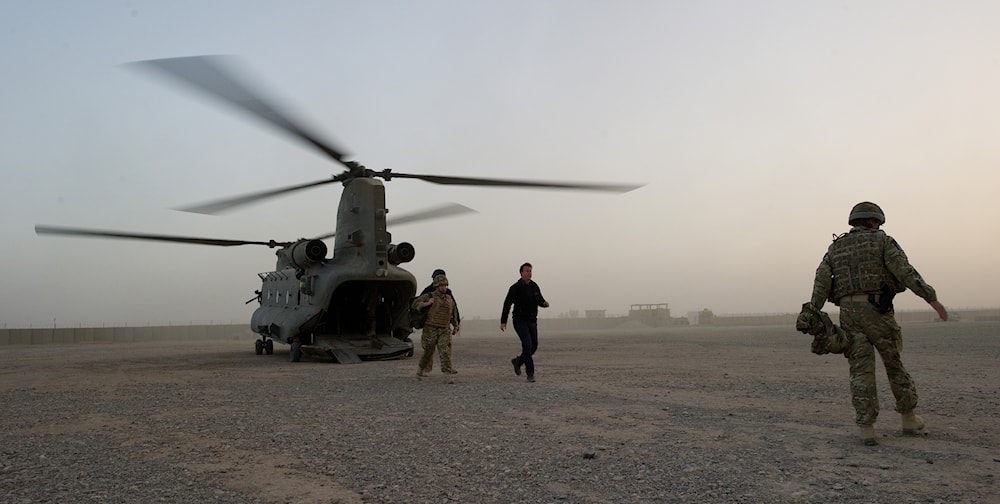SAS deleted data on killings of unarmed Afghans: Declassified UK
According to Declassified UK, information presented to the Afghanistan inquiry exposes that the special forces unit of the army intentionally erased crucial data linked to the deaths of more than 50 Afghans.
-

Then-British Prime Minister David Cameron, center, arrives at the Helmand Police Training Centre in Afghanistan Monday, December 6, 2010. (AP)
In an investigative report, Declassified UK reported that the SAS has been accused of destroying information crucial to shedding light on suspicious circumstances surrounding the killing of unarmed Afghans. This revelation came to light during hearings of an inquiry prompted by claims that SAS soldiers unlawfully killed over 50 Afghans between 2010 and 2013.
Recently uncovered evidence, largely overlooked until last week, exposed how the SAS deliberately erased data from its computers, violating assurances it had given to the Royal Military Police (RMP), according to Declassified, adding that the inquiry revealed that SAS soldiers faced serious allegations of misconduct and attempted to obstruct justice through a cover-up.
A report by Action on Armed Violence, a UK-based research charity, details the various covert activities of #UK special forces that have been observed in media leaks around the world. pic.twitter.com/OB7LpHMLVW
— Al Mayadeen English (@MayadeenEnglish) May 26, 2023
Richard Hermer KC, representing Afghan victims, characterized the SAS's disregard for directives to retain evidence as highly suspicious, and potentially a criminal attempt to change the course of justice, in a multiple homicide investigation.
In response, Oliver Glasgow KC, counsel for the inquiry, pointedly acknowledged the validity of the observation, stating that the allegation before the inquiry was that the data was wiped as part of a cover-up to prevent the Royal Military Police from recovering evidence related to extrajudicial killings.
Were prisoners executed?
During the inquiry, one SAS soldier was questioned about his awareness that investigations encompassed accusations of extrajudicial killings, essentially the execution of prisoners. The question emphasized the gravity of the matter for UK Special Forces, the entire British Army, and potentially the country as a whole.
The soldier responded that he was not aware that the deleted data was pertinent to the allegations, despite being instructed to investigate its removal, according to Declassified UK.
A senior Royal Military Police (RMP) officer accused the SAS of casually discarding data without regard for instructions, stating, "[they] just dropped data wherever they wanted...[they] just ignored us."
‘Incredulity’ by special forces
The inquiry, as covered by Declassified, previously heard that the SAS was responsible for the deaths of two sleeping Afghans in an incident that also resulted in serious injuries to two children.
In 2011, emails authored by special forces members expressed "incredulity" regarding the official account of SAS night raids that led to the deaths of Afghan individuals. Richard Hermer, representing Afghan victims, cited phrases from these emails, such as: "Quite incredible…we don’t believe this"; "Latest massacre!"; "You couldn’t MAKE IT UP!"; and "The way we are writing these up will not bear scrutiny in years to come."
Read next: UK MoD opens inquiry into Afghan killings at the hands of its troops
BBC Panorama disclosed that in the same year, one of Britain’s most senior generals was warned about SAS soldiers claiming to have executed handcuffed detainees in Afghanistan. The general also received accounts of conversations in which SAS members described extrajudicial killings. Rather than reporting this evidence to military police, General Gwyn Jenkins placed it in a classified dossier and secured it in a safe.
Extreme secrecy
Ben Griffin, an SAS soldier, was silenced by the Ministry of Defense through a high court order when he exposed the practice of British special forces transferring detainees to the US and local security authorities in Iraq and Afghanistan, leading them to secret interrogation centers before being sent to Guantanamo Bay, according to Declassified UK.
The collaboration between Britain's special forces and intelligence agencies like MI6 and GCHQ has been growing, with elite units like E Squadron participating in joint foreign missions with MI6, including operations in Libya.
Read next: Declassified UK: foreign ministry 'misled parliament' in Assange case
Despite this increasing collaboration, the cross-party Intelligence and Security Committee in Parliament has opted not to scrutinize the special forces alongside MI6, GCHQ, and MI5. In its latest annual report, the committee acknowledged the "erosion of parliamentary oversight of intelligence and security matters" but stated that it must have the ability to oversee such work comprehensively to fulfill its function of scrutinizing the government's actions on intelligence and security matters on behalf of Parliament and the public.

 4 Min Read
4 Min Read








